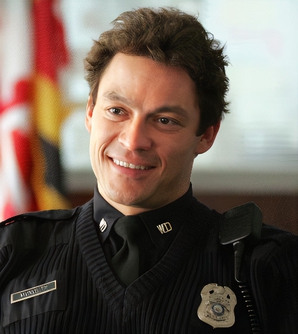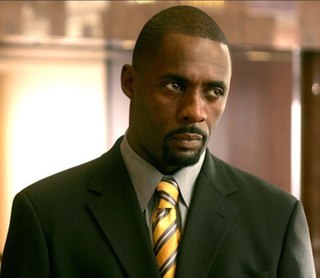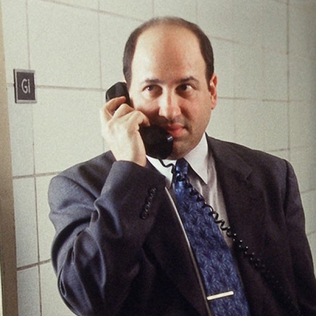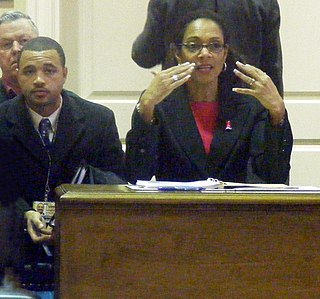
The Wire is an American crime drama television series created and primarily written by American author and former police reporter David Simon. The series was broadcast by the cable network HBO in the United States. The Wire premiered on June 2, 2002, and ended on March 9, 2008, comprising sixty episodes over five seasons. The idea for the show started out as a police drama loosely based on the experiences of Simon's writing partner Ed Burns, a former homicide detective and public school teacher.

James McNulty is a fictional character and the protagonist of the HBO drama The Wire, played by Dominic West.

Russell "Stringer" Bell is a fictional character in The Wire, played by Idris Elba. In the criminal world of early 2000s Baltimore, Bell serves as drug kingpin Avon Barksdale's second-in-command and assumes direct control of the Barksdale Organization during Avon's imprisonment. Bell is a terse and brooding leader, who shuns the flamboyance of the likes of Avon for ruthless pragmatism and legitimacy.

Avon Randolph Barksdale is a fictional character in the American television series The Wire, played by Wood Harris. Barksdale is one of the most powerful drug dealers in Baltimore, Maryland, and runs the Barksdale Organization. Stringer Bell, his second in command, insulates Barksdale from law enforcement and potential enemies. Working for Barksdale and Bell is a large organization of drug dealers and enforcers.

Omar Devone Little is a fictional character on the HBO crime drama series The Wire, portrayed by Michael K. Williams. He is a notorious Baltimore stick-up man, who frequently robs street-level drug dealers. He is legendary around the city for his characteristic duster, under which he hides his shotgun, large caliber handgun, and bulletproof vest, as well as for his facial scar and his whistling of "The Farmer in the Dell" when stalking targets. Omar's homosexual character is based on the heterosexual Baltimore area robber and hitman Donnie Andrews. Andrews served 18 years in prison after murdering a drug dealer. Andrews was married to Francine Boyd, who inspired the miniseries The Corner on HBO.
"Time After Time" is the first episode of the third season of the HBO original series The Wire. The episode was written by David Simon from a story by David Simon & Ed Burns and was directed by Ed Bianchi. It originally aired on September 19, 2004.
"Hamsterdam" is the fourth episode of the third season of the HBO original series The Wire. The episode was written by George Pelecanos from a story by David Simon & George Pelecanos and was directed by Ernest Dickerson. It originally aired on October 10, 2004.

Marlo Stanfield is a fictional character on the HBO television drama The Wire, played by actor Jamie Hector. Stanfield is a young, ambitious, intelligent and ruthless gangster and head of the eponymous Stanfield Organization in the Baltimore drug trade. Marlo's organization starts out small-time, competing with the larger Barksdale Organization, but rises to the top of the Baltimore drug trade fairly quickly.
"Reformation" is the tenth episode of the third season of the HBO original series The Wire. The episode was written by Ed Burns from a story by David Simon & Ed Burns and was directed by Christine Moore. It originally aired on November 28, 2004.
"Middle Ground" is the 11th episode of the third season of the HBO original series The Wire. The episode was written by George Pelecanos from a story by David Simon & George Pelecanos and was directed by Joe Chappelle. It originally aired on December 12, 2004. The episode was nominated for the Primetime Emmy Award for Outstanding Writing for a Drama Series.
"Mission Accomplished" is the 12th and final episode of the third season of the HBO original series The Wire. The episode was written by David Simon from a story by David Simon & Ed Burns and was directed by Ernest Dickerson. It originally aired on December 19, 2004.

Joseph Stewart, better known as "Proposition Joe" or "Prop Joe", is a fictional character on the HBO drama The Wire, played by Robert F. Chew. Joe is an Eastside drug lord who prefers a peaceful solution to business disputes when possible. He is responsible for creating the lucrative New Day Co-Op with Stringer Bell, supplying much of Baltimore with heroin brought into the city by "The Greeks". Displaying a cunning, business-oriented demeanor, Joe is often a match in stature for rival drug lords Avon Barksdale and Marlo Stanfield, and is able to manipulate most situations to his advantage.

R. Clayton "Clay" Davis is a fictional character on the HBO drama The Wire, played by actor Isiah Whitlock, Jr. Davis is a corrupt Maryland State Senator with a reputation for pocketing bribes. However, throughout the series Davis remains protected by other ranking politicians and Baltimore Police Commissioner Ervin Burrell.

MauriceJ. "Maury" Levy is a fictional character in the HBO drama The Wire, played by Michael Kostroff. He is a skilled defense attorney and was kept on retainer by the Barksdale Organization, later by Proposition Joe and ultimately by the Stanfield Organization. He represented members of his clients' organizations at various criminal trials, advising them on defense strategy on charges ranging from drug trafficking, murder, and criminal possession of a weapon to parole negotiation. He also acted and advised for Barksdale Organization's front organizations and Stringer Bell's real estate business. Levy is corrupt and unscrupulous, willing to aid his clients in furtherance of their criminal activity.
The Barksdale Organization is a fictional drug-dealing gang on the television series The Wire. Many of the characters featured in season one of The Wire belong to this organization. Season 1 largely deals with the Baltimore Police Department setting up a Major Crimes Unit to investigate the Barksdale Organization, led by Avon Barksdale who is portrayed as the most powerful drug kingpin in Baltimore.
Law enforcement is an integral part of the HBO drama series The Wire. The show has numerous characters in this field and their roles range from those enforcing the law at street level up to those setting laws citywide. The Baltimore City Police Department has been explored in detail from street level characters to the upper echelons of command. The show has also examined those setting laws in city politics and touched upon the FBI, the correctional system and the family of police officers.
Street-level characters comprise a large part of the cast on the fictional HBO drama series The Wire. Characters in this section range from homeless drug addicts up to drug king-pins in charge of entire criminal empires.

Rhonda Pearlman is a fictional character on the HBO drama The Wire, played by actress Deirdre Lovejoy. Pearlman has been the legal system liaison for all of Lieutenant Cedric Daniels' investigations on the show. Later in the series, she begins a relationship with Cedric Daniels.

The trial of Sheila Dixon, then mayor of Baltimore, started on November 9, 2009. It was the first of two scheduled trials for Dixon on a variety of charges. The charges stemmed from alleged corruption on the part of the mayor involving gifts she allegedly received and gift cards she allegedly stole.
Nathan "Bodie" Barksdale was a Baltimore, Maryland, stick up kid dramatized in the HBO series The Wire, although the extent to which any of the show's characters or plot lines are based on his life is disputed. His life is the subject of the unreleased docudrama Baltimore Chronicles: Legends of the Unwired, which purports to be the true story behind The Wire. He was in the early stages of writing his autobiography at the time of his death.










